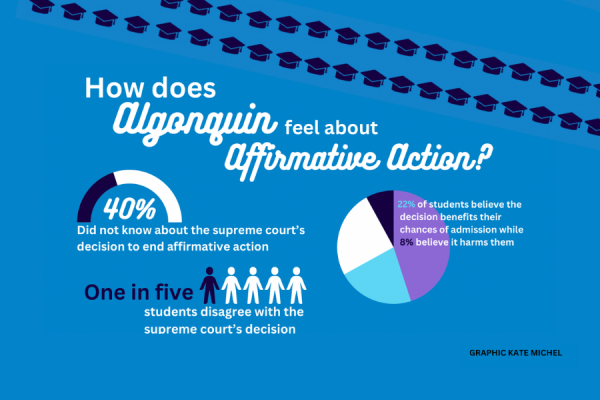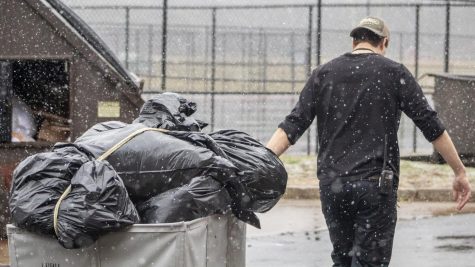The past, present, and future of senior end-of-year antics and festivities

INTRODUCTION
Within recent years, senior end-of-year festivities have escalated from peaceful seniors marching outside the school to some soon-to-be-grads posing safety threats and legal complications for members of the Algonquin community. While some pranks have remained light-hearted, others have magnified into substantial hazards; student injuries have ranged from bumps and bruises to concussions, custodians have put in hours overtime to restore the school’s clean and safe environment, and animals brought into the school have faced physical trauma, mental abuse, and even death.
However, The Harbinger archives, as well as spoken records from faculty and alumni alike, have indicated that in the long term, similar levels of crudeness have traditionally existed in some aspects of senior pranks, from, as The Harbinger reported in 1990, “hanging a dead animal from the ceiling on the ramp” to seniors throwing several live goldfish down the stairs in more recent years. In a rising generation that prides itself on sensitivity and awareness, traditional practical jokes may be perceived as more mean-spirited or distasteful than they were years ago.
What were end-of-year celebratory activities like before problems arose? What will the administration do in the future to prevent out-of-hand senior pranks? And how do seniors know where to draw the line between a funny trick and a serious offense?
BEFORE
Senior pranks have been going on as long as anyone can remember; in a 1990 issue of The Harbinger, Mr. Damore, then a faculty member at Algonquin, stated that senior pranks had “been a tradition for as long as I’ve been here.”
Dick Walsh, however, after 61 years at Algonquin, remembers the history of pranks more specifically than “forever.” Thinking back to when his daughters were students at the school, he considered the first seniors pranks he remembered.
“[Seniors] stole some things from the science department and hung them up somewhere,” Walsh said. “I think my daughter was in that class. That was in the seventies.”
Upon Harbinger investigation, Walsh confirmed that the stolen items were pig fetuses leftover from AP Biology dissections, hung from the ceiling of the old ramp.
Others who have been members of the Algonquin community for several years have fully realized the effects of some pranks.
“[The worst prank] wasn’t one I saw, it was one I smelled; somebody put a fish in a locker, a dead fish. That one was pretty bad and that was definitely my first year here [2003],” Librarian Michelle Rehill said.
The Senior March hasn’t been going on for as long as pranks, but they, too, have developed and adopted new characteristics over the years.
“Honestly, our first March that we ever had here was the best thing, a wonderful thing,” Assistant Principal Mel Laughton said. “The kids came in and came through the building very respectfully, celebrated their forthcoming graduation, and it was a wonderful thing. But every class thereafter decided to add their own mix to it, and it ended up being very dangerous, scaring people, that sort of thing; thus, we had to get rid of it.”
Senior Marches in recent years have involved shaving cream messes, broken chairs and tables, and dead fish, mice and rats.
“When [seniors] stood on the tables and chanted [after the March], that was my unfavorable one,” Walsh said. “They shouldn’t stand on the tables. They broke a table or two over the years! Not only did they stand on the tables, but the kids that were eating got their lunches all messed up.”
Last year’s March, which caused such an alarming amount of disruption and destruction that all future Senior Marches were banned, interrupted science teacher Aimee Selby’s teaching and left piles of shaving cream outside her door.
“The whole march last year, with the shaving cream everywhere and the mess that everybody made during the whole senior march last year was pretty bad,” Selby said.
NOW
Laughton and Principal Tom Mead agreed that, relative to those of recent years, the festivities and pranks of the Class of 2016 were relatively respectful and acceptable to the administration’s standards. However, unseen by most students, a collection of blasphemous and dangerous pranks occurred behind the scenes.
“There were a few things that happened that never should have happened,” Laughton said. “There were things that people aren’t aware of because we took care of it before the community even came together.”
According to Mead, a group of seniors put up a “defaming” poster outside the building at the Lower School parking lot, which was taken down before students arrived at the school in the morning. Mead declined to reveal the poster’s contents, but suggested crude, immature ideas.
“There are some [pranks] that I just really don’t want to talk about,” Laughton said.
A selection of pranks posed a physical threat to members of the school community. This year, mimicking a 2014 prank, seniors attached a trash barrel precariously to the top of a stairwell.
“It’s not fair to do something that can make people fearful and it’s not okay to do something such as tie a barrel over a stairway, which has the potential of falling and hitting someone in the head, which it has done in the past,” Laughton said. “Although, the barrel did not fall this year. Two or three years ago, a barrel fell and hit a girl on the head; she had to be sent to the nurse, had a concussion.”
To prevent injuries, the administration felt they had a responsibility to ban certain festivities and pranks.
While the majority of this year’s seniors begrudgingly accepted the administration’s’ restrictions, some members of the Class of 2016 found ways to express their discontent with the restrictions on senior traditions prior to their graduation.
“We were being yelled at by a few raucous members of the Class of 2016, a few loud ones, who were not happy with the banning of shaving cream, water balloons, and the like,” Mead said. “I know that some of the changes that we strongly suggested for this year were not popular, but we gotta break the habit of some of this stuff.”
“The blockade that they did down on D100 was not held as planned and it was their way of making a statement that they wished other things,” Laughton said. “As a matter of fact, it was told to me by one of the assistant principals that one of the kids said that they would end it if we gave them the march. In other words, they just demonstrated a lot of petulance and immaturity.”
THE FUTURE
The administration will continue to enforce rules on senior pranks and prohibited end-of-year festivities in upcoming years.
“We make decisions that we have to do, and we even made the decision where we had to cancel Senior Ball [in 2015],” Laughton said. “We will do what we have to do to make sure that this building is protected from kids who, for whatever reason, feel that they need to make a statement by doing something negative or scaring the people in the building.”
“Unfortunately, there will never be another senior march. That was done in by kids who just couldn’t play by the rules, do the right thing,” Laughton said.
However, faculty and administration alike expressed enthusiasm for rising seniors to be more creative with their “pranks,” and find a way to leave a more positive mark on the school.
DRAWING THE LINE
“Call it the Holy Trinity- the three things that I would like pranks to not be associated with: knock off the animals, knock off the destruction or the damaging of property, and don’t disrupt the rest of the school,” Mead said.
Mead emphasized his opposition to involving animals in end-of-year celebratory activities, especially after the physical and psychological trauma inflicted on several animals, and in extreme cases, deaths.
“We’ve had a goat out there, and we’ve had chickens walking through the hallways; vermin, rodents, mice,” Mead said. “Sporadically over the years, we’ve had a little dose of this and a dose of that. I don’t want any animals involved in a prank.”
Instead of ending senior pranks, Mead hopes that students will get more creative for the future, and find ways to conduct their shenanigans safely.
“I think we’re herding for ideas right now,” Mead said. “There’s a paucity of ideas.”
Laughton, however, offers more specific advice for rising seniors, modeled after pranks executed by the Class of 2016.
“I certainly enjoy it when people come [into my office],” Laughton said. “I don’t know if you know, but there were a couple people who wrapped my car in saran wrap this year. That was outrageous! That was funny, funny, funny!”
For now, underclassmen and faculty members alike can only hope that future senior classes will spare them the angry goats and aim to unify rather than harm.
A donation of $40 or more includes a subscription to the 2025-26 print issues of The Harbinger. We will mail a copy of our fall, winter, spring and graduation issues to the recipient of your choice. Your donation supports the student journalists of Algonquin Regional High School and allows our extracurricular publication to purchase equipment and cover our annual website hosting costs.

My name is Jen Fox, and I'm currently a senior and Co-Editor-in-Chief with one of my best buddies, Riya Pujari. When I'm not in the Publications room,...














P. Navas • Jun 2, 2017 at 9:02 am
The shaving cream incedent was very immature; I nearly got it on my coat